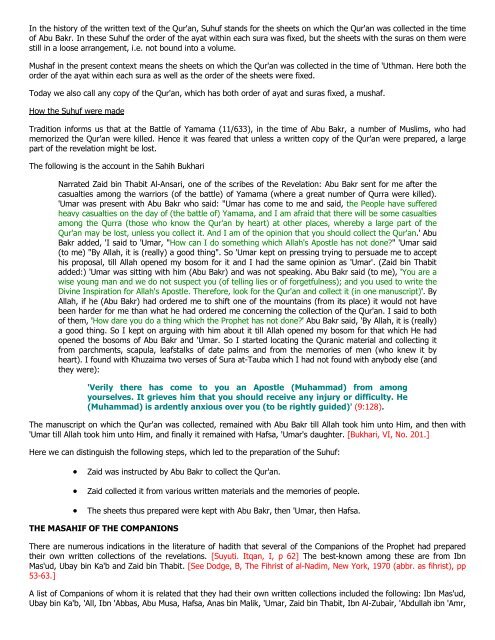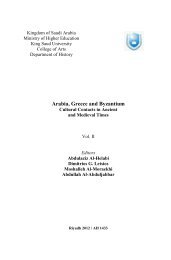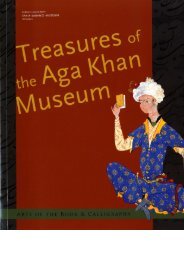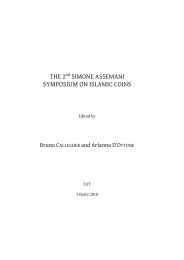ulum-al-quran
ulum-al-quran
ulum-al-quran
Create successful ePaper yourself
Turn your PDF publications into a flip-book with our unique Google optimized e-Paper software.
In the history of the written text of the Qur'an, Suhuf stands for the sheets on which the Qur'an was collected in the time<br />
of Abu Bakr. In these Suhuf the order of the ayat within each sura was fixed, but the sheets with the suras on them were<br />
still in a loose arrangement, i.e. not bound into a volume.<br />
Mushaf in the present context means the sheets on which the Qur'an was collected in the time of 'Uthman. Here both the<br />
order of the ayat within each sura as well as the order of the sheets were fixed.<br />
Today we <strong>al</strong>so c<strong>al</strong>l any copy of the Qur'an, which has both order of ayat and suras fixed, a mushaf.<br />
How the Suhuf were made<br />
Tradition informs us that at the Battle of Yamama (11/633), in the time of Abu Bakr, a number of Muslims, who had<br />
memorized the Qur'an were killed. Hence it was feared that unless a written copy of the Qur'an were prepared, a large<br />
part of the revelation might be lost.<br />
The following is the account in the Sahih Bukhari<br />
Narrated Zaid bin Thabit Al-Ansari, one of the scribes of the Revelation: Abu Bakr sent for me after the<br />
casu<strong>al</strong>ties among the warriors (of the battle) of Yamama (where a great number of Qurra were killed).<br />
'Umar was present with Abu Bakr who said: "Umar has come to me and said, the People have suffered<br />
heavy casu<strong>al</strong>ties on the day of (the battle of) Yamama, and I am afraid that there will be some casu<strong>al</strong>ties<br />
among the Qurra (those who know the Qur'an by heart) at other places, whereby a large part of the<br />
Qur'an may be lost, unless you collect it. And I am of the opinion that you should collect the Qur'an.' Abu<br />
Bakr added, 'I said to 'Umar, "How can I do something which Allah's Apostle has not done" 'Umar said<br />
(to me) "By Allah, it is (re<strong>al</strong>ly) a good thing". So 'Umar kept on pressing trying to persuade me to accept<br />
his propos<strong>al</strong>, till Allah opened my bosom for it and I had the same opinion as 'Umar'. (Zaid bin Thabit<br />
added:) 'Umar was sitting with him (Abu Bakr) and was not speaking. Abu Bakr said (to me), 'You are a<br />
wise young man and we do not suspect you (of telling lies or of forgetfulness); and you used to write the<br />
Divine Inspiration for Allah's Apostle. Therefore, look for the Qur'an and collect it (in one manuscript)'. By<br />
Allah, if he (Abu Bakr) had ordered me to shift one of the mountains (from its place) it would not have<br />
been harder for me than what he had ordered me concerning the collection of the Qur'an. I said to both<br />
of them, 'How dare you do a thing which the Prophet has not done' Abu Bakr said, 'By Allah, it is (re<strong>al</strong>ly)<br />
a good thing. So I kept on arguing with him about it till Allah opened my bosom for that which He had<br />
opened the bosoms of Abu Bakr and 'Umar. So I started locating the Quranic materi<strong>al</strong> and collecting it<br />
from parchments, scapula, leafst<strong>al</strong>ks of date p<strong>al</strong>ms and from the memories of men (who knew it by<br />
heart). I found with Khuzaima two verses of Sura at-Tauba which I had not found with anybody else (and<br />
they were):<br />
'Verily there has come to you an Apostle (Muhammad) from among<br />
yourselves. It grieves him that you should receive any injury or difficulty. He<br />
(Muhammad) is ardently anxious over you (to be rightly guided)' (9:128).<br />
The manuscript on which the Qur'an was collected, remained with Abu Bakr till Allah took him unto Him, and then with<br />
'Umar till Allah took him unto Him, and fin<strong>al</strong>ly it remained with Hafsa, 'Umar's daughter. [Bukhari, VI, No. 201.]<br />
Here we can distinguish the following steps, which led to the preparation of the Suhuf:<br />
<br />
<br />
<br />
Zaid was instructed by Abu Bakr to collect the Qur'an.<br />
Zaid collected it from various written materi<strong>al</strong>s and the memories of people.<br />
The sheets thus prepared were kept with Abu Bakr, then 'Umar, then Hafsa.<br />
THE MASAHIF OF THE COMPANIONS<br />
There are numerous indications in the literature of hadith that sever<strong>al</strong> of the Companions of the Prophet had prepared<br />
their own written collections of the revelations. [Suyuti. Itqan, I, p 62] The best-known among these are from Ibn<br />
Mas'ud, Ubay bin Ka'b and Zaid bin Thabit. [See Dodge, B, The Fihrist of <strong>al</strong>-Nadim, New York, 1970 (abbr. as fihrist), pp<br />
53-63.]<br />
A list of Companions of whom it is related that they had their own written collections included the following: Ibn Mas'ud,<br />
Ubay bin Ka'b, 'All, Ibn 'Abbas, Abu Musa, Hafsa, Anas bin M<strong>al</strong>ik, 'Umar, Zaid bin Thabit, Ibn Al-Zubair, 'Abdullah ibn 'Amr,





